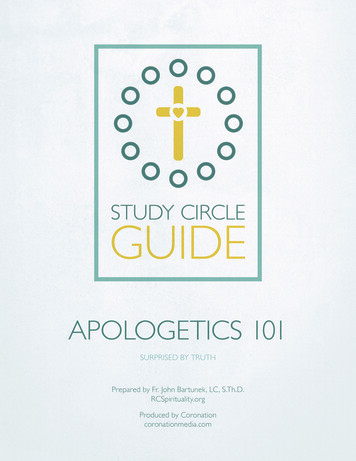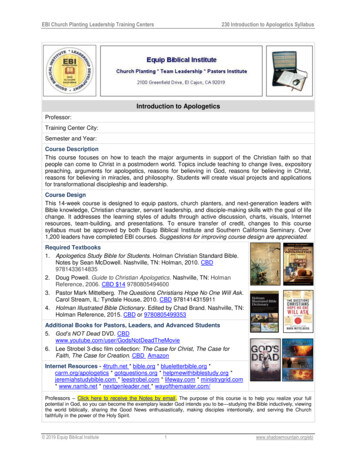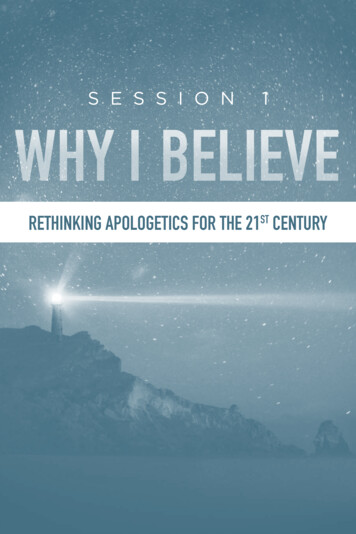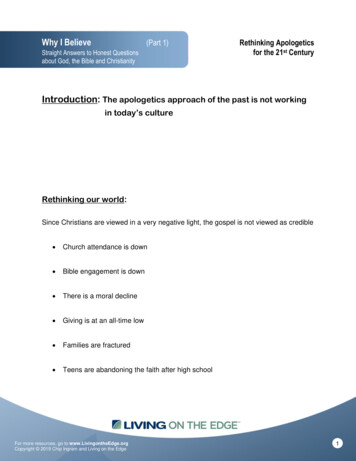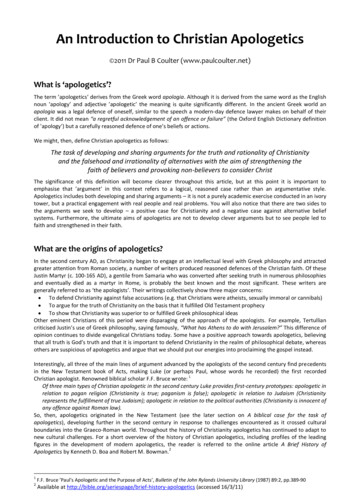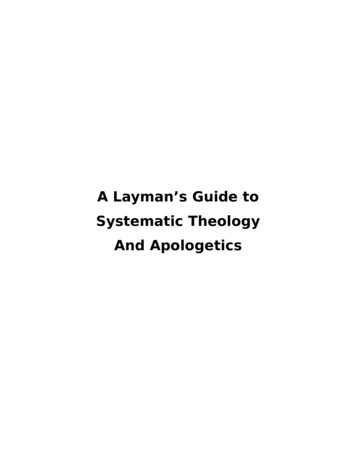
Transcription
ApologeticsCOMMUNITY GROUPBy Steve JonesEdited by Claire MummertCURRICULUM
Table of ContentsLesson 1: The Resurrection Proves God Exists (Mark 2:1-12) .4Lesson 2: The Resurrection Answers the Problem of Evil (Revelation 1:17-18) .10Lesson 3: The Resurrection Shows Us God Clearly (Acts 17:22-34) .15Lesson 4: The Resurrection Confirms We Can Trust the Bible (John 5:39-40) .22Lesson 5: Defending the Resurrection (1 Corinthians 15:1-8) .27Resources Page .34
How to Use this GuideReview the context and big picture every week – The goal of a book study is not just to learneach individual lesson, but to build understanding of the Bible, how it fits together, and how tostudy it.Try not to use this guide as a script. The purpose of this material isn’t to give you exactly whatto say. Rather it is to give you the content you need to structure and develop your own lessons.Teach as much as you feel is important for your class. Feel free to go off topic if your own studyleads you to approach the passage in a slightly different direction.Don’t feel like you have to cover everything. There is a lot of material in each lesson. Someclasses like to cover a lot of ground. Other classes like to camp on one point and drill deep.Start by teaching the Main Point, then teach the Main Bullet Points. Use the extra detail anddiscussion questions as you see fit. The goal is to generate discussion, specifically regardinglife-application. So don’t worry if you don’t get all the way through a lesson.[3]
Lesson 1 The Resurrection Proves God ExistsMark 2:1-12I love HEB, and I am not the only one. HEB is routinely ranked as one of the best, if not the best,grocery stores in America. Frankly, I don’t know how people outside of Texas survive without it. Iam not sure which is worse, not knowing HEB exists, or knowing it exists and not being able to goto one. One thing I love about HEB is this thing they call their “Meal Deal,” in which they put a mainentre dinner item on sale, then offer, for free, every possible other item you would need to have acomplete meal. An example of a meal deal might be: buy a small pot roast and receive potatoes,carrots, rolls, a box of cookies, and a jug of tea for free. Just buy one thing and you get everythingelse thrown in for free.Why am I bringing this up? Well, forgive the potentially sacrilegious metaphor, but Christianity is alot like an HEB Meal Deal. The foundational claim of Christianity is that Jesus died and rose again.By foundational, I mean that everything else is built on top of it. Believing in the resurrection is themain course. Once you buy it, you realize you get the answers to so many other questions thrownin.We are beginning a series on Apologetics, which simply means the study of arguments defendingour faith. The word “apologetics” comes from the Greek word “apologia” which doesn’t mean tobe sorry or apologize, it means to give a defense.There are a lot of different ways to approach apologetics. Some people use philosophy to makeprofound arguments. Some use history to gather evidence to support the historical reliabilityof the Bible. Some even use literature and the arts to tell stories that show how the story ofChristianity answers the deepest questions of the human heart.(See the Resources Page at the end of this study for a short list of these works.)I think the greatest Apologetics tool is the Resurrection. Whenever someone asks me what Ibelieve about things like the problem of evil, disagreements in religion, or even whether or notthere is a god, my approach is simply to say: “What did Jesus say about that?” and why do I believeJesus? Because He rose from the dead.[4]
So, over the next few weeks, we are going to look at how the resurrection can help usanswer some of the big questions every person asks. We will then end, on the Sunday beforeEaster, with a defense of the resurrection itself. It might seem odd to end the study with theresurrection instead of beginning with it. But we are doing this for two reasons: first, so that weare studying the same issues in community groups as we are in the sermon series; and second,so that we have a chance really close to Easter to make a case for the resurrection for peoplewho don’t normally come to church any other time. Perhaps postponing the discussion of theresurrection will build in us some excitement and anticipation as we realize how much reallydoes depend on the fact the Jesus was alive on Easter Sunday.The first question we are tackling is Does God Exist? Such a simple question to ask, but not sosimple of a question to answer.One reason the question is so hard to answer is because people ask it in different ways. Wesay things like “If God is real, why can’t I see Him,” or “If there is a God, why is there so muchevil in the world,” or “If God exists, why do people disagree on who He is?” These are all goodquestions in their own right and are worth addressing individually. But they do not necessarilydisprove God’s existence, but rather raise questions about God’s nature.Another reason the question is hard to answer is that people ask it from different perspectives.Some people ask the question from a skeptical or antagonistic point of view. Others havesincere, honest doubts and don’t know what is true. Still others claim to have faith but havequestions that are gnawing on their faith and make them think they are losing it.The good news is that there are some really good arguments for the existence of God.Ultimately, though, the existence of God is one of those things that is true because Jesus rosefrom the dead. The argument goes something like this: Jesus claimed to be God. If He wasright, then God exists. Why should you believe Jesus’s claim to be God? Because He rose fromthe dead.Jesus Claimed to be the God of Israel (John 8:56-59)Some suggest that Jesus never claimed to be God. This is simply not true. Though we haveno record of Him actually saying the phrase, “I am God,” there are several places where Jesusclearly states that He considers Himself to be one with the Father.The term “god” is very generic. It’s nondescript. The Jews did not believe in “god.” Theybelieved in a specific God, the God who revealed Himself to Abraham, Isaac, Jacob, and Joseph.The God who gave the Law to Moses on Mt. Sinai. And that God had a name. In Exodus 3:13[5]
15, at the Burning Bush, when God sends Moses to Egypt to deliver His people, Moses asks Godwhat His name is: “Behold, I am going to the sons of Israel, and I will say to them, ‘The God ofyour fathers has sent me to you.’ Now they may say to me, ‘What is His name?’ What shall I sayto them?” God said to Moses, “I AM WHO I AM”; and He said, “Thus you shall say to the sons ofIsrael, I AM has sent me to you.’”I AM is the name that God reveals to Moses. It refers to the fact that God didn’t come intobeing. He just IS. There is no past or future to God. This name of God is often translatedthroughout the Old Testament as “Yahweh” or “Jehovah” or “Lord (in all caps).” In the NewTestament, there are several places where Jesus uses the phrase, “I am.” Each time He does so,He is claiming to be the God of the Hebrews. An example of this can be found in John 8:56-59.Jesus is talking to the Jews about how they claim to follow Abraham but Abraham himself wasrejoicing about Jesus. Towards the end, notice what Jesus says and how the Jews respond:Your father Abraham rejoiced to see My day, and he saw it and was glad.” 57 So the Jews saidto Him, “You are not yet fifty years old, and have You seen Abraham?” 58 Jesus said to them,“Truly, truly, I say to you, before Abraham was born, I am.” 59 Therefore they picked up stones tothrow at Him, but Jesus hid Himself and went out of the temple.”“56Before Abraham was, I AM. We might just read over that quickly. But the Jews knew whatHe meant. He was claiming to be God and so they picked up stones and tried to kill Him forblaspheming.Jesus Claimed to Forgive Sins (Mark 2:1-12)Another way that Jesus claimed to be God is through forgiving sins. Jesus didn’t just forgivesins that people had committed against Him. He forgave all their sins. Let’s look closely ata scene in Mark 2 where a paralytic man is brought to Jesus by his friends. Jesus takes thisopportunity not only to heal but to show us who He really is. Jesus Meets a Paralytic Man (v1-4): Jesus comes to Capernaum and begins to teach.The house is soon flooded with people coming to hear Him. Luke 5:17 says that inaddition to teaching, “the power of the Lord was present for Him to perform healing.”Four men rush their paralytic friend to Jesus. When they don’t find a way into thehouse, they dig a hole in the roof and lower the man down on his stretcher before Jesus.Most houses in Judea were made of mudbrick. The roofs were flat and sometimeshad stairs or a ladder going up so that people could use the roof like a terrace in thecool of the evening. So, we shouldn’t be shocked that they were able to get up there.[6]
What is amazing is that they were able to dig a hole in the roof big enough to lower aman on a stretcher. For some reason, this always strikes me as a little bit comical. Doyou think Jesus and the people below heard the scratching or noticed debris begin tofall on them? Do you think they were accurate in the first hole they started, or did theyhave to try again when they realized they were not digging directly over Jesus?However the scene materialized, the men were successful in deconstructing the roofand in lowering their friend down through the opening in front of Jesus. Jesus Forgives a Paralytic Man (v5-7): If that wasn’t startling enough, what Jesus doesin response definitely raises eyebrows. He comments on the faith of the man’s friends,then proceeds to forgive the paralytic man’s sins. The Pharisees realize the significanceof what Jesus just did. Verse 7 is such an important verse. The Pharisees say, “Whydoes this man speak that way? He is blaspheming! Who can forgive sins except Godalone?” They know that only God has the power to forgive all of someone’s sins. Theyrealize Jesus is claiming to be the God who forgives sin. So, they accuse Him ofblasphemy.But there is another group that was probably scandalized by what Jesus said. Thinkabout it. Four men brought their sick friend to Jesus, destroying someone else’s housealong the way. They wanted their friend healed. Can you see them peeking in throughthe hole they dug? Maybe one of them whispered to another up there on the roof,“So, did He heal him? What is happening? I can’t see.” The other says, “Wait, Jesus issaying something nope, He didn’t heal him, He just forgave his sins.” Then maybeanother one of them hollered down, “No, Jesus, he can’t walk! We brought him here forhealing.” Jesus Heals a Paralytic Man (v8-12): What happens next shows that Jesus isorchestrating the moment to reveal something about Himself to everyone. He asksthose present a question. Which is easier to say to a paralytic: “your sins are forgiven” or“get up and walk?” The truth is that the first one is easier “to say.” Why? Becausethere is no way to tell whether you actually did it or not. Telling a paralytic person tostand up and walk is incredibly difficult because there will be visible, tangible proof ofwhether you have the power to do what you say.[7]
That is the point Jesus is working towards. He is demonstrating to people that He hasthe power to do what they cannot see by showing He has the power to do what theycan see. In Mark 2:10-11 Jesus says, “10 But so that you may know that the Son of Manhas authority on earth to forgive sins”—He said to the paralytic, 11 “I say to you, get up,pick up your pallet and go home.”Liar, Lunatic, or LordSometimes we try to make Jesus easier to handle by pretending He was just a good teacher.Some suggest that Jesus never claimed to be God. This is simply not true. Though we haveno record of Him actually saying the phrase, “I am God,” there are several places where Jesusclearly states that He considers Himself to be one with the God of Israel and claims for HimselfGod’s ability to forgive all sins. You can choose not to believe that Jesus is who He said He is.But you can’t pretend that He didn’t claim to be God. It’s a scandalous claim that prevents usfrom thinking of Him simply as a good teacher.Only three kinds of people claim to be God: crazy people, deceivers, and God. So, He eitherwasn’t God and knew He wasn’t, which makes Him a liar. He wasn’t God and didn’t know it,which makes Him a lunatic. Or He was, and is, God. Those are the only three choices we have.As CS Lewis said in Mere Christianity, “You must make your choice. Either this man was, and is,the Son of God, or else a madman or something worse. You can shut Him up for a fool, you canspit at Him and kill Him as a demon, or you can fall at His feet and call Him Lord and God but letus not come with any patronizing nonsense about His being a great human teacher. He has notleft that open to us. He did not intend to.”ConclusionThe Good news is that the resurrection of Jesus gives us reason to believe that Jesus is whoHe said He is. And if He is who He said He is, then God exists. The hard part is that the Godrevealed in Jesus is more than a philosophical abstraction to talk about in classes or coffeeshops. Jesus shows us more than whether God exists. He shows us who God is. And calls usinto relationship with Him. That ends up being more than some people bargain for.[8]
Discussion Questions:1. Have you ever wondered if God exists?2. How does Jesus saying “I am” count as Jesus claiming to be God?3. How does Jesus saying “Your sins are forgive” count as claiming to be God?4. What does Liar, Lunatic or Lord mean? Why is it impossible to think of as just a good teacher?5. How does the resurrection prove that God exists?[9]
Lesson 2 The Resurrection Answers the Problem of EvilRevelation 1:17-18I remember sitting across the table from a good friend of mine who asked to meet me for coffee.After a few minutes of pleasantries, he finally nervously summoned up the courage to ask hisquestion, or more accurately, to make a statement. “I think I am losing my faith.” I asked him whyhe felt he was losing his faith, and he responded that he was trying to come to terms with howGod could be good and there could be so much evil in the world. The first thing out of my mouthsurprised him. I said, “You aren’t losing your faith, you’re gaining it.”Most people interpret the doubts they experience as temptations to stop believing in God.More likely, this is an opportunity to grow in our understanding of who God is. As Christians, weshouldn’t be afraid of asking questions. Faith isn’t blindly believing what we are told. Faith meansbasing our lives on what we have to believe to be true. And confirming what we believe is true is avery reasonable thing to do. Too many people have been turned away from Christianity becausethey were asking questions good questions and not only would no one answer them, maybethey were even told that asking the question itself was wrong. My friend thought he was driftingaway from God when actually God was drawing him closer by provoking in him questions thatwere encouraging him to seek answers and to seek God.But his specific question, wasn’t just a good question. It is THE question. One of the mostimportant ones. Inquire long enough of most people and you will find that the one thing theyreally don’t understand is the problem of evil. They might use different language like, “Why dobad things happen to good people.” But they still ask it. Ask people who have walked away fromGod or who are increasingly skeptical of His existence, and you find at the heart of their objection aclaim that all the evil in the world is proof that God isn’t real.Look in the Bible, the oldest book in the Old Testament is the book of Job, a 40-chapter inquiryinto the goodness of God in the midst of suffering. It’s okay to ask the question. There are goodanswers. But before we answer the question, it is important for us to articulate it clearly. Havinga clear understanding of the problem will help us not only to seek answers but also to see howcertain answers are overly simplistic and fall short.[ 10 ]
Here is the Problem of Evil in its simplest form: there are 4 statements that don’t seem to beable to all be true:1. God is all knowing2. God is all powerful3. God is all good4. Evil existsTo many people’s minds, it doesn’t seem possible for all these statements to be true at thesame time. If God really was all knowing, He would know every time someone was about tocommit evil. If He was all powerful, He could stop them from doing evil. If He was all good,then He would want to stop them. But evil does exist, so therefore, either God isn’t one ofthose things, or He isn’t there at all.If you look closely at rival worldviews and philosophies, you will find ways that people havetried to solve this problem by negating one of these premises. Polytheism denies God’s powerby saying there are more than one god in control. Pantheism denies God’s goodness by sayingthat everything is God even the stuff we happen not to like. Believe it or not, some even denythe existence of evil. Buddhism denies the existence of evil and claims it is an illusion. AndAtheism denies God’s existence all together.First Steps in Answering the ProblemBefore we look closely at the heart of the Christian answer, there are a few preliminary topicsthat need to be addressed that will prepare us to understand the heart of the Christian claim. God Didn’t Create Evil – If God created everything, then did God create evil? No, Goddid not create evil. Then, where did evil come from? Well, the answer to this questionstarts with considering the nature of evil. God created everything in the world, and itwas good. Evil isn’t a thing, nor is it found in things. It’s a misuse of a thing, a twistingof it from what it was intended to be used for. Take, for example, a knife. In the handsof a surgeon, it can save a life. In the hands of a robber, it can take it. Evil cannot create,it can only twist and corrupt what God originally created good. Evil is a shadow. Goodcan exist without evil. Evil can’t exist without good.[ 11 ]
God Hates Evil – It is also important to remember that God hates evil. In Romans1:18, Paul writes, “For the wrath of God is revealed from Heaven against all ungodlinessand unrighteousness of men who suppress the truth in unrighteousness.” On first look,this verse might make God sound harsh and unloving. But look closer and noticewhat it says the wrath of God is revealed against . not people but on ungodliness andunrighteousness. God hates sin. God’s wrath is against sin. Why? Because sin causesdeath. Romans 6:23 that “the wages of sin is death.” Death is what sin pays out. Deathis what sin produces in our lives. When we seek sin, we find death. That is why Godhates sin. You see, God’s wrath is one part of the answer to the problem of evil. God isas mad about sin and death and evil as we are. In fact, He is more mad than we are atall the evil, sin, pain, and death in the world and He is actively working to free us from itand to destroy it forever. God Suffered Evil – One of the hardest things about suffering evil is thinking thatno one knows what we are going through. The incarnation shows us that God becameman and walked among us. He took on our weak and wounded humanity and livedlife as a man (Philippians 2:5-11). The writer of Hebrews says that because of this, Jesusknows what we are going through. He has gone through it too. He knows ourweaknesses. He knows our needs. He knows our failings. Hebrews 4:15-16 says, “15For we do not have a high priest who cannot sympathize with our weaknesses, but Onewho has been tempted in all things as we are, yet without sin. 16 Therefore let us drawnear with confidence to the throne of grace, so that we may receive mercy and findgrace to help in time of need.” These verses show us that Jesus is proof that God issympathetic to our suffering and strong to help us. He offers us mercy and graceto help in time of need. Mercy means “not getting a bad thing we do deserve.” Mercyis forgiveness of wrongs willfully committed. Grace is the flipside of mercy. Grace is“getting a good thing we don’t deserve.” Jesus offers us grace to help us when we needit. That means you don’t have to go it alone. You don’t have to suck it up and try harder.You just have to acknowledge your need and go to the real source of strength. God Mourns Evil – John 11:35 is the shortest verse in the Bible. All it says is, “Jesuswept.” But it may be one of the most profound. It happens while Jesus is discussing thedeath of His friend Lazarus with his sisters Mary and Martha. He has just told Martha, “Iam the resurrection and the life.” He is about to raise Lazarus from the dead. Butstanding at the tomb of His friend, Jesus is moved to tears at all the suffering andpain. He knew what He was about to do. He knew that their weeping was about to turn[ 12 ]
to amazement and joy. But He didn’t mock them or chastise them for their grief. Hewept with them. “Jesus wept” is proof that Jesus cares about us and the pain we aregoing through. No matter how insignificant it may seem to others. No matter that oneday He will undo all the sin and evil and pain in the world. Right now. In the midst ofyour grief, Jesus grieves too. In the midst of your tears, Jesus cries too. Jesus knowsyour pain, and it hurts Him too.The Resurrection Proves: Jesus Defeated Evil (Rev 1:17-18)It may be reassuring to know that God didn’t create evil, and that He hates it, has gone throughit, and mourns it. But if that is all there is, then it doesn’t get us very far. Fortunately, those ideasall prepare us to hear the central Christian answer to the problem of evil. Jesus defeated it.In Revelation 1:17-18, John recounts meeting the Risen Jesus when he writes, 17 When I sawHim, I fell at His feet like a dead man. And He placed His right hand on me, saying, “Do not beafraid; I am the first and the last, 18 and the living One; and I was dead, and behold, I am aliveforevermore, and I have the keys of death and of Hades.” Jesus tells John that He was dead andhas come back to life and because of that not only will He never die again, but He has powerover death.The Resurrection Proves: Evil Wont Wreck God’s PlanMany times, we think that evil people are in control. But our lives are in God’s hands, not theirs.All the evil in the world doesn’t wreck God’s plan. Paul reassures us in Romans 8:28 that “Godcauses all things to work together for good to those who love God, to those who are calledaccording to His purpose.” God isn’t shocked or scared by all the evil in the world. He doesn’tlike it. But it is not surprising to Him. And He is powerful to cause all thing to work together forgood.One great example of this happens in the story of Joseph in the book of Genesis. Joseph’solder brothers hate him and sell him into slavery. While in slavery, he is falsely accused of acrime and thrown into prison. While in prison, he helps people who promise to rememberhim and get him out, but they don’t. Finally, after a lot of heartache, he gets out of prison andis exalted to a place of power where he comes face to face with the brothers who started thiswhole mess. Instead of exacting revenge, he says in Genesis 50:20, “As for you, you meant evilagainst me, but God meant it for good in order to bring about this present result, to keep manypeople alive.” Joseph doesn’t excuse his brothers’ sins against him or even try to pretend it wasgood. What he does say is that God took what they intended for evil and used it to do good.[ 13 ]
The Resurrection of Jesus Proves: Evil Won’t have the Last Word (Rev. 21:1-5)Revelation 21 shows us what the world will look like when God restores His creation. Verses 4and 5 say, “4 and He will wipe away every tear from their eyes; and there will no longer be anydeath; there will no longer be any mourning, or crying, or pain; the first things have passedaway.” 5 And He who sits on the throne said, “Behold, I am making all things new.” These versesshow us that God promises to heal what is broken and end all pain. And most amazingly,He will make all things new again. This means that there will not be a single place wheresin, death, or evil claim a victory that will be allowed to stand. Every single instance will beoverturned and everything God made will be remade how He always intended for it to be.It might sound too good to be true. But we can rest assured that it is true because He lives.Discussion Questions:1. Have you ever wrestled with the problem of evil? What are some different ways people askthe question? What are some bad or incomplete answers that the world offers to this question?2. Did God create evil? What is evil? What is evil’s relationship to good?3. What does Romans 1:18 say about God’s wrath? How is God’s wrath proof that He hates evil?4. What is the significance of the incarnation when it comes to the problem of evil?5. How does the resurrection show that evil is defeated? How does it show that evil wont havethe last word?[ 14 ]
Lesson 3 The Resurrection Shows Us God ClearlyActs 17:22-34If God is real, why are there so many different religions? At one time or another, many of us havehad this thought. Sometimes it gets expressed in the form of bad ideas like: Aren’t all religionsvalid? Isn’t the main thing to be sincere and consistent? Religions are just different paths up thesame mountain to God. Either heard, said, or thought, these are honest, nice sounding bad ideas.One of the reasons people aren’t open to discussing differences in belief is because it almostalways centers on the question of “who is going to hell?” Many discussions between people withdiffering beliefs eventually boil down to one person saying, “So you think I’m going to hell?”Often times, this is the fault of Christians. We frequently present the gospel to people as makingsure they have the right answer to a secret question; otherwise, God will send them to a terribleplace. We need to realize that Hell is not an evangelism strategy. I am not trying to deny theexistence of Hell. Jesus Himself talked about Hell. He just never used Hell as a means of gettingpeople to follow Him. To people whose lives were broken by sin, He offered forgiveness and life.We need to think about religion as spiritual medicine. When doctors go to developing countries,they don’t tell locals that all views of medicine are equally valid so they should keep doing whatthey are doing. Nor do they go to the other extreme and threaten them with death unless theyaccept this new view of health. Doctors point out how their view of health is right, wrong, orincomplete and needs to be clarified. They do it not to shame, bully, or control. They do it to bringlife.Christianity offers healing for diseased souls. We all have a bad picture of who God is. It comesfrom our honest but incomplete searching for God. And it is causing us to think bad things andlive in bad ways. And it produces death in your own life.Today, we are going to look at a passage in Acts which describes Paul’s visit to Athens. Paul walksaround and sees the result of people living out the consequences of having an incomplete pictureof who God is. He doesn’t shame, bully, or threaten them. He shows them how their picture ofGod needs to be brought into focus. The last words of Paul’s speech are important. In verse 31,[ 15 ]
Paul concludes with, “having furnished proof to all men by raising Him from the dead.” TheResurrection is proof that if you want the clearest picture of who God is, you need to look atJesus. Now let us look at what Paul says before this and how he brings our picture of God intofocus.God Made Us to Seek Him (v22-28)The question of the hiddenness of God is a real one that many people have. It is sometimesexpressed in other ways, like, “If God is real how come I can’t see Him?” or “Why does God hideHimself?” Many people think they would have an easier time believing in God if they couldonly see Him.The question of God’s hiddenness is an important one. It’s a great question to ask. One reasonGod hides is to give us freedom. Think back to the beginning of the Bible. In Genesis 3, afterAdam sins, God comes looking for him and asks, “Where are You?” God gives us space to giveus freedom. If God were tangibly present every minute of every day, we would perceive Himlike a parent looking over our shoulder or a teacher proctoring an exam. In the space God givesus, we have real freedom. Freedom to sin like Adam did. But also, freedom to seek. God hasleft enough of Himself in the world to make belief in Him reasonable and rational. He has leftenough of Himself out to allow sinful selfish people to go on about their business. God rewardsseeking. God also leaves room to avoid Him if you want. Ken Boa famously said, “There areonly two kinds of people in the world: those who seek God and those who seek to avoid God,and both will be successful in the end.”The Bible is full of promises that God rewards seeking. In Jeremiah 29:13, God says throughthe prophet, “You will seek Me and find Me when you search for Me with all your heart.” InMatthew 7:7-8, Jesus said, “7 Ask, and it will be given to you; seek, and you will find; knock, andit will be opened to you. 8 For everyone who asks receives, and he who seeks finds, and to himwho knocks it will be opened.”Paul says something similar to the people of Athens. He starts his evangelistic message bydiscussing this idea of seeking God. Our Seeking
We are beginning a series on Apologetics, which simply means the study of arguments defending our faith. The word “apologetics” comes from the Greek word “apologia” which doesn’t mean to be sorry or apologize, it means to give a defense. There are a lot of different ways to approach

